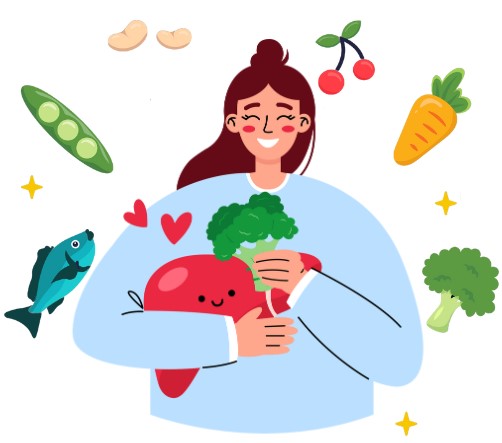
Have you ever wondered about the incredible and important work your liver does inside your body every day?
Your liver is a powerhouse, tackling over 500 functions in the body to ensure your overall well-being stays happy and healthy! Most importantly, the liver is responsible for roles such as detoxifying your system, helping in digestion and nutrient absorption, balancing your cholesterol, maintaining blood sugar levels, and storing of essential vitamins A, D, E, K and B.
As we grow older, nutrient intake tends to decline and appetite has shown to decrease. To ensure a well-functioning liver, it is essential to make every bite count! Fortunately, there is a proactive approach in maximizing your meals with nutrient-dense foods that support your liver’s health and prevent the onset of chronic diseases such as fatty liver disease, which impacts the liver’s main function roles. Let’s explore some key nutrients and practical strategies to help love your liver’s health.
Good Fats (Omega-3’s):
Our bodies are unable to produce healthy fats such as omega-3, which have anti-inflammatory properties and have shown to support liver function and decrease the development of liver disease. Therefore, omega 3’s needs to come from our diet and can be found in salmon, tuna, crab or in plant sources such as walnuts, almonds, seeds and canola/olive oils.
Fiber:
Fiber is essential in decreasing overall bad cholesterol stuck throughout the body and stabilizes blood sugars throughout the day. Studies have shown that an increase in fiber intake can have positive results on your liver’s overall health and reduce inflammation throughout the body. Fiber can be found in various foods such beans, vegetables, fruits and nuts. Try choosing whole grain foods such as corn, bulgur, quinoa, brown rice and oats. For older adults, our aim is about 21-30 grams of fiber per day. An easy way to achieve this goal is to add. For example, adding 1 cup of chickpeas to your dinner amazingly provides 12 grams of fiber. Already half way there!
Antioxidants and Minerals:
Foods rich in antioxidants are mostly found in colorful fruits and vegetables such as carrots, plums, red cabbage and guava. They have shown to support liver function and minerals such as phosphorus, selenium and magnesium have decreased the risk of fatty liver disease. If you are keeping a varied diet, many of these nutrients can be similarly found in foods such as dark leafy greens, brazil nuts, brown rice, poultry and fish.
Proteins:
Diet patterns heavy on animal protein, including beef, pork, lamb, or processed meats such as bacon, hotdogs, and cold cuts, have been shown to increase the risk of liver disease and impact liver function. Instead, try to incorporate protein from alternative/leaner sources as often as possible, such as beans, lentils, tofu, tempeh, chickpeas, seafood, poultry, or eggs.
Ways to Love Your Liver:
Caring for your liver requires making mindful choices about the food you consume. To start, you can gradually incorporate nutrient-rich foods into your daily meals. You may want to try cooking with extra virgin olive oil or explore plant-based options like tofu, tempeh or lentils on Meatless Mondays. To increase your intake of healthy fats, consider consuming canned tuna or salmon two (2) to three (3) times a week or have a handful of nuts every day. Add variety to your diet by incorporating new fruits and vegetables into your weekly grocery list. It can also be helpful to add a colorful salad before dinner to ensure a range of nutrients before every meal. Remember, small changes can make a big impact!
So, ask yourself, what delicious and tasty food can I add to my plate today?